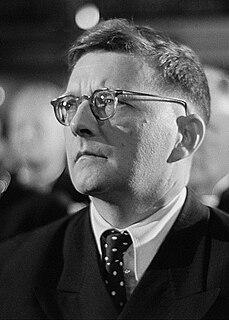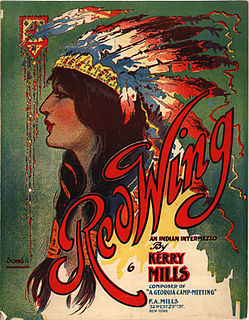| "Poor Mary" | |
|---|---|
| Nursery rhyme | |
| Published | 1880s |
"Poor Mary" or "Poor Jenny" is an English language nursery rhyme and singing game. It has a Roud Folk Song Index number of 1377.
Lyrics vary considerably for this song. Over a hundred known variations have been collected in Britain since the 1880s, not least in the use of the names, including Jenny, Mary and Sally. Common modern versions include:
One child of the group is chosen to be "Jenny" or "Mary" etc., and has to kneel in the middle of a circle, usually with head in hands. The other children join their hands and walk around the other child singing the first verse. The child in the centre then carries out the actions of the following verses, most importantly choosing a partner.
The tune is widely known in Europe, and forms the first section of the folk dance tune "La Bourrée des Galvachers" from Burgundy, France. [2] The melody was also used by Dmitri Shostakovich in his first Piano Concerto, op.35. [3]

Dmitri Dmitriyevich Shostakovich was a Soviet-era Russian composer and pianist who became internationally known after the premiere of his First Symphony in 1926 and was regarded throughout his life as a major composer.
"Twinkle, Twinkle, Little Star" is a popular English lullaby. The lyrics are from an early-19th-century English poem written by Jane Taylor, "The Star". The poem, which is in couplet form, was first published in 1806 in Rhymes for the Nursery, a collection of poems by Taylor and her sister Ann. It is sung to the tune of the French melody "Ah! vous dirai-je, maman", which was published in 1761 and later arranged by several composers, including Mozart with Twelve Variations on "Ah vous dirai-je, Maman". The English lyrics have five stanzas, although only the first is widely known. It has a Roud Folk Song Index number of 7666.

"Mary Had a Little Lamb" is an English language nursery rhyme of nineteenth-century American origin. It has a Roud Folk Song Index number of 7622.

"Good King Wenceslas" is a Christmas carol that tells a story of a Bohemian king who goes on a journey, braving harsh winter weather, to give alms to a poor peasant on the Feast of Stephen. During the journey, his page is about to give up the struggle against the cold weather, but is enabled to continue by following the king's footprints, step for step, through the deep snow. The legend is based on the life of the historical Saint Wenceslaus I, Duke of Bohemia (907–935). The name Wenceslas is a Latinised version of Old Czech "Venceslav".

"London Bridge Is Falling Down" is a traditional English nursery rhyme and singing game, which is found in different versions all over the world. It deals with the dilapidation of London Bridge and attempts, realistic or fanciful, to repair it. It may date back to bridge-related rhymes and games of the Late Middle Ages, but the earliest records of the rhyme in English are from the 17th century. The lyrics were first printed in close to their modern form in the mid-18th century and became popular, particularly in Britain and the United States, during the 19th century.
The Cello Concerto No. 1 in E-flat major, Op. 107, was composed in 1959 by Dmitri Shostakovich. Shostakovich wrote the work for his friend Mstislav Rostropovich, who committed it to memory in four days and gave the premiere on October 4, 1959, with Yevgeny Mravinsky conducting the Leningrad Philharmonic Orchestra in the Large Hall of the Leningrad Conservatory. The first recording was made in two days following the premiere by Rostropovich and the Moscow Philharmonic, under the baton of Aleksandr Gauk.
The String Quartet No. 15 in E-flat minor, Op. 144 by Dmitri Shostakovich is the composer's last. It was his first quartet since the Sixth which did not bear a dedication.

"This Land Is Your Land" is one of the United States' most famous folk songs. Its lyrics were written by American folk singer Woody Guthrie in 1940 in critical response to Irving Berlin's "God Bless America", with melody based on a Carter Family tune called "When the World's on Fire". When Guthrie was tired of hearing Kate Smith sing "God Bless America" on the radio in the late 1930s, he sarcastically called his song "God Blessed America for Me" before renaming it "This Land Is Your Land".
"She Moved Through the Fair" is a traditional Irish folk song, which exists in a number of versions and has been recorded many times. The narrator sees his lover move away from him through the fair, after telling him that since her family will approve, "it will not be long, love, till our wedding day". She returns as a ghost at night, and repeats the words "it will not be long, love, till our wedding day", intimating her own tragic death and the couple's potential reunion in the afterlife.

Lorenzo "Laurel" Aitken was an influential Caribbean singer and one of the pioneers of Jamaican ska music. He is often referred to as the "Godfather of Ska".

A children's song may be a nursery rhyme set to music, a song that children invent and share among themselves or a modern creation intended for entertainment, use in the home or education. Although children's songs have been recorded and studied in some cultures more than others, they appear to be universal in human society.
"The Farmer in the Dell" is a singing game, nursery rhyme, and children's song. It probably originated in Germany and was brought to America by immigrants. From there, it spread to many other nations and is popular in a number of languages. It is Roud Folk Song Index number 6306.
"The Water Is Wide" is a folk song of Scottish origin. It remains popular in the 21st century. Cecil Sharp published the song in Folk Songs From Somerset (1906).
Moscow, Cheryomushki is an operetta in three acts by Dmitri Shostakovich, his Op. 105. It is sometimes referred to as simply Cheryomushki. Cheryomushki is a district in Moscow full of cheap subsidized housing built in 1956, and the word is also commonly used for such housing projects in general.
"Mary Blane", also known as "Mary Blain" and other variants, is an American song that was popularized in the blackface minstrel show. Several different versions are known, but all feature a male protagonist singing of his lover Mary Blane, her abduction, and eventual death. "Mary Blane" was by far the most popular female captivity song in antebellum minstrelsy.
The Concerto in C minor for Piano, Trumpet, and String Orchestra, Op. 35, was completed by Dmitri Shostakovich in 1933. The concerto was an experiment with a neo-baroque combination of instruments.
Lord Saltoun and Auchanachie, is a Scottish folk song.
"A Breathtaking Guy" is a 1963 song written and produced by Smokey Robinson and released first by Motown singing group The Supremes (1963) and later by The Marvelettes (1972). The single was originally released under the title "A Breath Taking, First Sight Soul Shaking, One Night Love Making, Next Day Heartbreaking Guy" by The Supremes, but was shortened after its official release. All three Supremes members - Diana Ross, Florence Ballard and Mary Wilson - sang the chorus with the original title together.

"Red Wing" is a popular song written in 1907 with music by F.A Mills and lyrics by Thurland Chattaway. Mills adapted the music of the verse from Robert Schumann's piano composition "The Happy Farmer, Returning From Work" from his 1848 Album for the Young, Opus 68. The song tells of a young Indian girl's loss of her sweetheart who has died in battle.
"When This Cruel War Is Over", also known under the title "Weeping, Sad and Lonely", is a song written by Charles Carroll Sawyer with music by Henry Tucker. Published in 1863, it was a popular war song during the American Civil War, sung by both Union and Confederate troops.